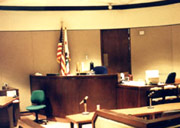| A federal bankruptcy judge is threatening the Roman Catholic Diocese of San Diego with contempt for allegedly attempting to hide assets to avoid payment to clergy sexual abuse victims. Judge Louise DeCarl Adler ordered the diocese's lead attorney into court Wednesday to explain why she and her colleagues should not be sanctioned. Adler cited a March 29 letter sent by a diocese parish organization to pastors urging them to get new taxpayer identification numbers and transfer funds to new accounts. The threat Monday came six weeks after the diocese sought bankruptcy protection amid lawsuits by more than 140 people who accuse priests of sexual abuse. The judge said any post-bankruptcy transfers between the diocese and parishes outside of normal cash operations violate her ruling against shifting the diocese's assets while the bankruptcy case is pending. She said any transfers require court approval. In a sternly worded order, Adler said attorneys Susan Boswell, Jeffry Davis and Victor Vilaplana appear to have "conspired with parishes" to create new bank accounts separate from the diocese. Boswell wrote in court documents Tuesday that no intentional misrepresentations or misstatements had been made. She said the diocese has "no access or control" over money in more than 770 bank accounts opened by parishes and parochial schools under the diocese's taxpayer identification number. Davis wrote in court papers that he thought comments Adler made in an earlier hearing suggested that parishes should obtain their own taxpayer identification numbers for clarity in the bankruptcy case. Attorneys for the alleged victims have repeatedly accused the church of trying to hide assets to reduce the overall sum available for potential settlements. They estimate that a fair settlement would total about $200 million. In March, the diocese proposed a $95 million settlement schedule for victims that would offer plaintiffs anywhere from $10,000 to $800,000. San Diego was the fifth U.S. diocese to file for bankruptcy. The other dioceses that have filed for bankruptcy protection are Davenport, Iowa; Portland, Ore.; Spokane, Wash.; and Tucson, Ariz. Tucson has emerged from bankruptcy protection, while proposed settlements are awaiting final approval in Portland and Spokane. |





